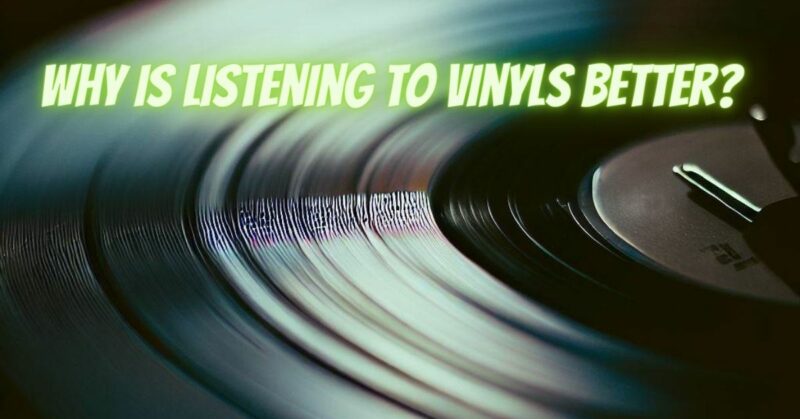In an era where digital music dominates the market, vinyl records have experienced a remarkable resurgence. Listeners are increasingly drawn to the unique experience and charm offered by vinyl, leading many to wonder why listening to vinyl is considered better by its enthusiasts. From the warm sound quality to the tactile engagement, there are several reasons why vinyl continues to captivate music lovers.
One of the primary reasons people prefer vinyl is the distinct sound quality it delivers. Vinyl records produce a warm and rich sound that is often described as more natural and authentic compared to digital formats. The analog nature of vinyl, with its grooves and physical playback, allows for a subtle and organic audio reproduction. The imperfections inherent in the vinyl medium contribute to its unique sound signature, which some argue adds depth, character, and a certain “life” to the music. Vinyl’s ability to capture the nuances and dynamics of a recording is often cherished by audiophiles who seek a more immersive and engaging listening experience.
Another aspect that sets vinyl apart is the ritualistic and tactile nature of the format. The act of handling physical records, delicately removing them from their sleeves, and carefully placing the needle on the spinning platter creates a sense of connection and involvement with the music. Vinyl demands active participation from the listener, as it requires attention to detail and a mindful engagement with the medium. Additionally, the large album artwork and liner notes provide a visual and textual dimension to the music, allowing for a deeper appreciation and understanding of the artist’s intent and the album’s concept.
Moreover, vinyl records offer a break from the fast-paced, on-demand nature of digital music consumption. Listening to vinyl encourages a more deliberate and focused approach, as it requires flipping the record over to hear the other side or carefully selecting the next album to play. This intentional listening experience allows for a dedicated and uninterrupted engagement with the music, fostering a sense of mindfulness and connection.
Furthermore, the resurgence of vinyl has led to a vibrant and passionate community of collectors and enthusiasts. The culture surrounding vinyl extends beyond just the music itself, with record stores, vinyl fairs, and meetups becoming hubs for like-minded individuals to share their passion. The tactile and tangible nature of vinyl fosters a sense of nostalgia and appreciation for physical media in an increasingly digital world. Collecting vinyl records can be seen as a form of art curation, as individuals curate their own personal collections, carefully selecting albums that resonate with their musical taste and interests.
It is important to note that the preference for vinyl is subjective and may not be universally applicable. The sound quality of vinyl can be influenced by various factors, including the quality of the recording, the condition of the record, and the playback equipment. Vinyl records also require proper care and maintenance to preserve their longevity and sound quality, which may be seen as an inconvenience by some.
In conclusion, the resurgence of vinyl records can be attributed to a combination of factors that make the format appealing to music enthusiasts. The distinct sound quality, tactile engagement, deliberate listening experience, and the sense of community all contribute to the perception that listening to vinyl is a superior way to experience music. However, it is important to remember that personal preference plays a significant role, and what may be considered better for one person may not hold true for another. Whether one chooses to embrace vinyl or digital formats, the most important aspect is the joy and connection derived from experiencing music in any form.


